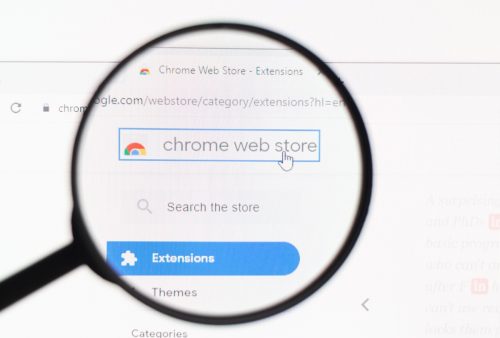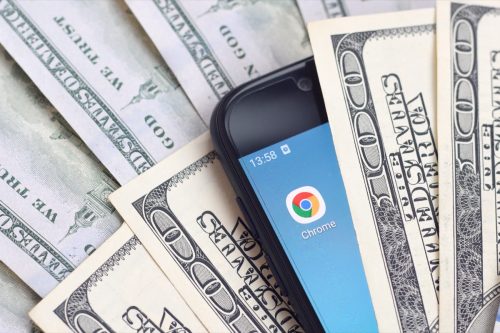Google Is Now Warning All Chrome Users Against Doing This

We all want to stay safe online. But with scams on the rise and hackers continuing to do what they do best, it can be difficult to ensure your information and data remain protected. Keeping passwords updated and being mindful of different phishing attacks are solid ways to stay vigilant, but the waters get murky when it comes to online downloads. Thankfully, Google is doing its part to keep Chrome users in the know, including issuing a new warning about potential unfriendly add-ons. Read on to learn more about what Google says you should avoid doing when using its popular Chrome browser.
RELATED: Google Just Issued This Urgent Warning to All Android Users.
Security breaches have been on the rise for different browsers and operating systems.

Google is far from alone in defending against cybercriminals. Microsoft warned Windows users earlier this week that it had identified nearly 120 vulnerabilities across Windows operating systems. Users were instructed to update their system to keep data and information safe.
Prior to Microsoft’s latest breach, Google made headlines when a total of 11 hacks of Google Chrome were confirmed, nine of which were “high” threats and two of which were “medium.” To stay protected, all Chrome users were advised to update their browsers. Now, Google has issued another warning for Chrome users, this time about a specific type of download.
Google warns that certain downloads can put you at risk.

Extensions allow users to add different features and capabilities to their browsing experience, including tools that check your grammar, help you find the best shopping deals, and block pesky pop-up ads. But as with any online download, you need to be careful when choosing which extension to use, as they can pose a security risk. According to Wired, some extensions are able to access all of your browsing activity and communicate with developers, advertisers, or third parties without your knowledge.
Google cautions against downloading harmful extensions, which is why the company has added two new badges to distinguish those that are reliable, according to a blog post written by Debbie Kim, a design manager for Chrome. “Since 2009, publishers have been hard at work building extensions that make Chrome more powerful, useful, and customizable for users,” Kim wrote in the post. “It has always been our mission to make it easy for users to find great extensions while recognizing the publishers who create them.”
By adding these badges, Google is working to save users a step when trying to determine whether an extension is safe to download. In turn, this also helps users avoid malicious extensions, which do unfortunately circulate on the Chrome Web Store, The Verge reported.
RELATED: For more up-to-date information, sign up for our daily newsletter.
There are two types of badges extensions can earn.

Google launched the Featured badge and the Established Publisher badge on April 20. To earn the Featured badge, the extension must follow Google’s “technical best practices and meet a high standard of user experience and design.” According to the blog post, extensions are reviewed by Chrome team members, who look for adherence to the Web Store’s best practice guidelines—which include respecting users’ privacy. The extensions store listing page is also taken into consideration, which should include “quality images” for users to review, as well as a thorough description.
The Established Publisher badge requires publishers to verify their identity and demonstrate compliance with developer program policies. Publishers are also required to have a “consistent positive track record” with Google services.
You can identify these badges thanks to different icons, but they’re not up for sale.

Apps that have earned the Featured badge will have an icon that looks like a prize ribbon. The Established Publisher badge looks like a checkmark surrounded by a wavy circle.
Google reassures users that these badges are not for sale and cannot be bought—which helps to avoid malicious extensions from simply purchasing the badge to appear reliable.
“As our goal is to help users find great extensions, publishers cannot pay to receive either badge,” the blog post states. “They can, however, submit a request for their extension to be reviewed to receive the Featured badge in the one-stop support page.”
RELATED: If You Get This Message From Google, Delete It, Experts Warn.